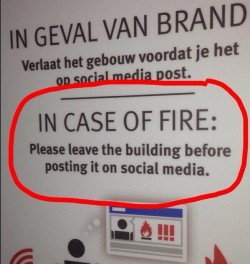Monthly Archives: August 2014

The mystery of giant concrete arrows on the American landscape, solved.
If the Fox takeover of Time-Warner succeeds, it could make for some really interesting superhero movies.
The bizarre story of the Dutch cyclist who had tickets to two Malaysia Airlines flights that met with a tragic end.
When someone falls for a joke in the form of a smear, it says more about them than it does the object of the joke/smear. Just own it and move on (like ThinkProgress did).
Maybe sunk costs aren’t sunk after all?
Will Davies makes the case against competitiveness.
Flextime is apparently a nice perk that you should never actually use. Here are some tips for waking up earlier. One of the best decisions I ever made about such things was to never, ever use the snooze button again.
It’s very lucrative to do the dirty work of oil companies. (And I don’t mean dirty in the sense of sweat and dirt or you might get oil on you…)
A new nuclear power plant design floats on the water and could ride out a tsumani.
Privilege I can believe in: The privilege of being good-looking.
Everything you ever wanted to know about astronaut outfitting.
Is the monopoly of copyright a lost cause? It’s sure seeming that way, though it’s hard to gauge all of the implications of that.
Pirates are complaining that the software they are illegally downloading takes up too much space.
WordPress spends considerable money complying with DMCA takedown notices, some of which are not legitimate. They’re demanding $10,000 for a false notice.
I get that smartphone theft is lucrative for the carriers and handset producers, but the most apparent solution would likely involve cracking down on all reselling, which is a cure worse than the disease.
It’s a win for fliers that we can use electronics during takeoff and landing. It’s a loss for SkyMall.
The immigrants of yesteryear were apparently smart to Americanize their name at Ellis Island. Writers, too, should choose their name carefully.
In addition to being careful about your name when you’re looking for a job, you should keep quiet about your religion, too. Unless you’re Jewish, because everyone likes the Jewish.
The case for kissing ass and faking it until you make it.
Either interesting facts about MOOCs.
It seems to me that one of the most challenging aspects of running a dating site is the degree of caution people – women in particular – is the wheat-from-the-chaff problem. Namely, differentiation between losers (and worse) and non-losers, and the serious from the unserious.
This is particularly a problem on the free ones (I don’t know if they exist anymore) or those with a monthly fee where it was most economical for a guy to shoot as many messages as possible and for the women to have to wade through them. Or vice-versa, but usually not.
One of the ways around this, of course, is to charge people money. LavaLife charged you each time you reached out to somebody, which was good at making sure that I only reached out when I was genuinely interested and probably cut back on the amount of sausage-spam the ladies got.
I was on a high-end site for a year. I couldn’t believe I was spending that much money, but the barrier actually proved to be a good thing. If I was paying that much, it did signal that I wasn’t a deadbeat. And if they were paying that much to be on the site, I could be sure that every message I sent out would almost certainly be read. Indeed, I got as many reach-outs on that site as I did on any other. There weren’t a whole lot of people, but cost was its own selection mechanism.
Of course, the “not a whole lot of people” proved problematic for the business, which disappeared shortly after my subscription expired. But if I had it all to do over again (and I hopefully won’t), I would probably not be thrifty about it because cost can have its own benefit.
There is a new site called Wyldfire that seeks to filter without too-high costs. A referral system:
“We’ve discovered that when it comes to dating apps, men will go anywhere where women go, but women won’t go anywhere men go unless it’s worth their time,” says Sarah Cardey, the director of operations and marketing for Wyldfire. “But if women are the ones creating the community and are accountable for the type of people they let in, we feel like we could make a dating app women can be proud of.”
This is the guiding principle behind Wyldfire (yes, “wild” is spelled with a “y,” a la “Wyld Stallyns” from Bill and Ted), a mobile dating app set to launch early next month. Unlike Tinder and other dating apps, which have no screening processes to filter out crotch shot-requesting creepsters, Wyldfire automatically filters out weirdos by having female users select men to invite to the app (you can invite users anonymously if you so choose by sending them a “feather,” or request to join, via Facebook or e-mail).
Dating apps may or may not be a saturated market, but it’s an interesting angle.
Meanwhile, I still haven’t figured out why Facebook hasn’t created the ultimate match site yet.
One of those listicles covering characters who disappeared from TV shows without explanation. It’s an odd list as some of them I thought sufficient explanation was given, like Erica Hahn from Grey’s Anatomy. She was dumped and humiliated when she made her exit, so I’d figured she just wanted to get the heck out of Seattle. They got Denise Huxtable wrong, who wasn’t on The Cosby Show when Money got pregnant (she was on A Different World), as well as Tori from Saved By The Bell who actually alternated with (as opposed to replacing mid-season) Kelly and Jessie. Minkus from Boy Meets World gets an entry (but not Mr. Turner, limiting themselves to one per show I guess). Though I don’t typically mind switching out casts, one of the ones that drove me crazy was Nikki Faber from Spin City.
 Faber, played by Connie Britton, was Michael J Fox’s character’s love interest for three seasons. It was pretty well done with a very good build-up. They actually got me to care about the answer to the “Will they? Won’t they?” question that writers are always wanting us to care about. They did!
Faber, played by Connie Britton, was Michael J Fox’s character’s love interest for three seasons. It was pretty well done with a very good build-up. They actually got me to care about the answer to the “Will they? Won’t they?” question that writers are always wanting us to care about. They did!
Then the very next season, they signed Heather Locklear as a cast regular as Caitlin Moore, and Mike and Nikki broke up at the opening of the season to make room for Mike/Caitlin, which I never cared as much about. When Fox left the show due to his health, it became Charlie/Caitlin with Charlie Sheen’s character. Which actually worked better, as far as that goes. Nikki disappears at the end of that season.
Later on during Sheen’s run on the show, Fox returns for an episode where he is engaged to be married and he’s using his affiliation with the mayor to check out of the whole thing (too busy to focus on the wedding, that sort of thing). Anyhow, that would have been a perfect opportunity for old school viewers like myself if Mike and Nikki had ended up together after all. But no, it was some other character. Boo.
Perhaps Britton was busy or too expensive. But it would have been almost as cool as Minkus’s return to Boy Meets World.
 Is Canada home to the nation’s biggest housing bubble?
Is Canada home to the nation’s biggest housing bubble?
Successive extentions and alterations of copyright law have limited our access to over fifty years of culture.
As software has come to control ever-increasing parts of our lives, it might behoove us to start coding better.
Teachers often feel like they are the punching bags of the current education debate. It turns out that they are still among the highest thought-of jobs, and have become moreso over the last twenty-five years.
The Dragonlance novels had an indelible influence on Dungeons and Dragons.
The debate around the efficacy of Alcoholics Anonymous has bounced around back and forth over the years. Penn & Teller made waves by declaring it bullpucky. Keith Humphreys argues, however that it’s actually as effective as psychotherapy.
Richard Nixon is often used as a punching bag in discussions about the Drug War, but it turns out that may not be so accurate.
Good news! We’re better at keeping drug use out of our prisons than is commonly perceived.
Important: The history of the ramen noodle.
According to tailor Charlie Allen, American business suits are for slobs.
Ben Shrecklinger argues that we should do away with the seven-day week. I’ve probably thought about it in the past, but while days are earth axis rotations and months are lunar rotations and years are revolutions around the sun, weeks are cultural.
Models for stock photography have no idea where their image will turn up. Digiday interviews a guy who turned up on Cialis ads.
Eric Barker explains the scientific method to a great first date.
A lot of people think that hosting the Olympics is a huge waste of resources. Cities themselves are coming around to this view.
Stephen Marche explains how Dead Poets Society has ruined our literary culture, while Robert Pindiscio worries that modern curricula and incentives are teaching young people to mostly write about themselves.
Ever wonder why it’s expensive rather than bargain hotels that charge for WiFi?
As a part of the loan application process, they had to run a credit check with a credit score. My credit score has actually gone down a bit, from the low 800’s to the 790’s. This has me oddly bummed, feeling like I must have done something wrong.
A part of me takes solace in the fact that my score is, according to the report, higher than 99.5% of other Americans. I take solace in it at a personal level, but find it a bit depressing on a societal level. All I have really consciously done to maintain this high score is pay my bills on time. Even then, I have missed a few, but I guess never enough to have the credit agencies alerted?
It seems to me that at least a quarter of the population should have the same credit score as I do, or higher. Ideally, over half. That a lot of people simply cannot do that is actually sort of depressing. Not to assign universal blame, because by “cannot” I mean “despite being responsible, do not have the means” as well as “could if responsible, but is irresponsible so can’t.”
I don’t see myself voting for Elizabeth Warren any time soon.
My own observational experience with people who have bad credit is mostly with people who could pay their bills if they were sufficiently responsible but are not. Which actually says more about me than it does the average person with a low credit score. People I know come disproportionately from the the upper-middle or lower-upper or at least the solid middle class.
I wonder how much of this sort of thing colors our perception of the people struggling to make it by. Among people like me, I mean. If most of the people you know in financial trouble are there because of mistakes that they’ve made, and if you come from a background where financial responsibility leads to good financial results, then it becomes harder to relate to those who are struggling. It becomes easy to see that guy as being the equivalent of the guy who screwed up a good hand, instead of having a bad hand to begin with. It becomes easy to be removed from the entire notion of having a bad hand.
